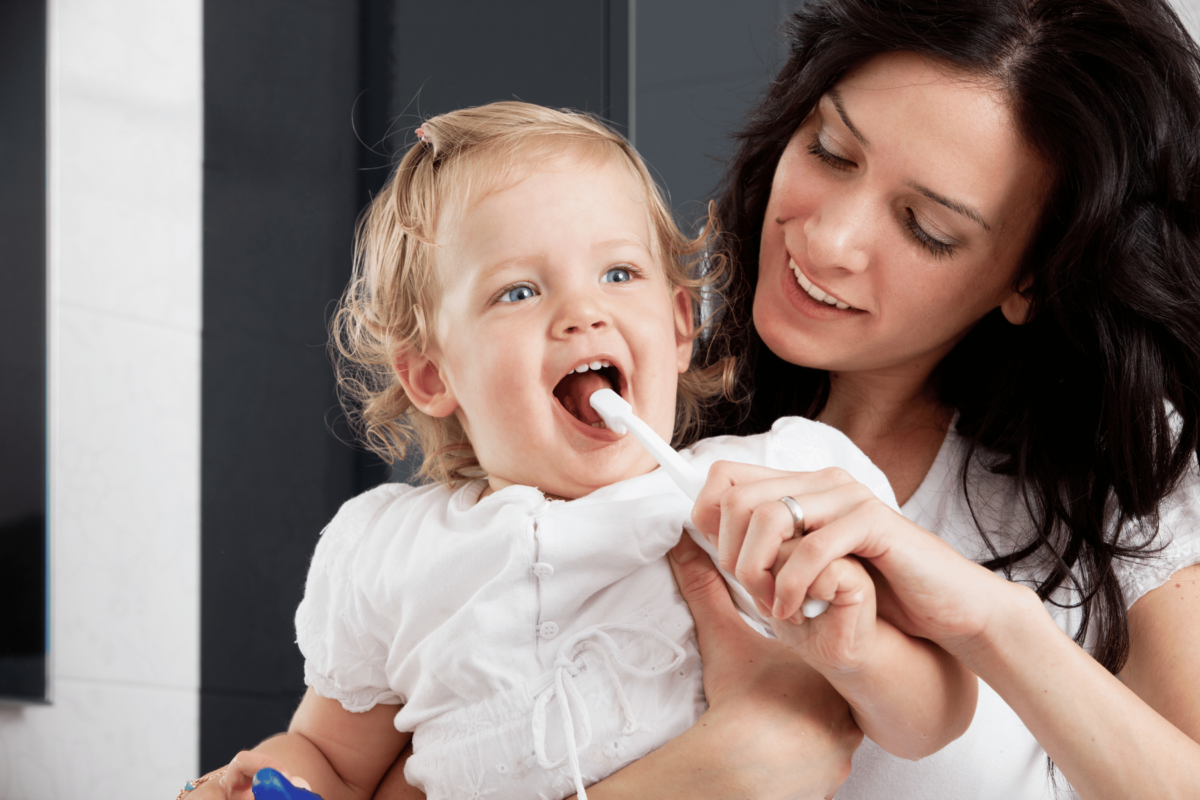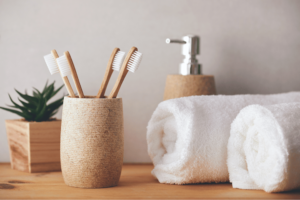5 Tips for Taking Care of Your Toddler’s Teeth
 Taking care of your toddler’s teeth is one of those areas that some parents find to be a struggle, but it is so important for their overall health, especially as they get older. At Vivid Smiles, we’re here to help you avoid those crocodile tears at the dental office.
Taking care of your toddler’s teeth is one of those areas that some parents find to be a struggle, but it is so important for their overall health, especially as they get older. At Vivid Smiles, we’re here to help you avoid those crocodile tears at the dental office.
Dental hygiene appointments can actually be FUN for kids. Kids like being told they’re doing a good job with their responsibilities as they get older, and a great dental team knows how to make the experience a positive one, with little games, rewards, and most of all – a gentle touch.
But even though we try our best to make visits to our clinic fun for the kids, we recognize that fillings are tough on the little ones, so proper dental care starts at home!
Here are five essential tips to help you take care of your toddler’s teeth:
1. Start Them Early.
Parents know breaking a habit is hard. Kids like routine and structure, and this absolutely applies to teeth. Begin caring for your toddler’s teeth as soon as they get their first tooth. Gently clean their gums with a soft, damp cloth or an ultra-soft toothbrush. You can introduce your child to toothpaste – about the size of a grain of rice is a good place to start and gradually increase it to a pea-sized amount by age three. Brush your toddler’s teeth at least twice a day, preferably in the morning and before bedtime. Trust us, it’s far easier to start them off early on tooth brushing, and while we always love to see you at check-ups, we love it even more when we can tell your kids “Wow, you’re doing such a great job taking care of your teeth!”. Side note: Either use a toothpaste with fluoride, or for those parents who prefer not to use fluoride, skip the ‘natural’ toothpaste, and instead try clinically proven alternatives such as REMIN. It’s active ingredient is hydroxy-apatite, which is a naturally occurring substance that remineralizes our teeth. Some of the toothpastes advertised as “healthy alternatives” don’t actually contain the ingredients needed for healthy gums and teeth, and your child will get more cavities using them. If you’re a health-conscious parent, you’ll get better health results by focusing on tip #2.
2. Diet Starts In Year 1
This one is no secret: diet is the biggest contributor to dental health, even in children. As parents we want good things for our kids, and to see their joy as they discover new foods that we all love.
Try to resist introducing sugary things to your kids, and I’m not just taking about pop. Here’s a good tip for you: children have no idea what strength juice is supposed to be – so dilute it! Better yet, stick with pure water! After a year or so of drinking only milk, many children LOVE water! It’s the favourite drink of most kids for a short period in their life, until they get exposed to sugary alternatives.
As for snacks, opt for healthier options like fruits, vegetables, and dairy products. Stay away from dried fruits and fruit leathers, which are high in sugar and stick to the teeth. There are many African countries – mostly central and southern parts of Africa – where there is limited access to processed foods. Diet in these countries consists primarily of raw unprocessed foods with no refined sugar. Such countries have extremely low rates of tooth decay. If oral health is a priority for your family, it is possible to avoid tooth decay through natural dietary choices here in Canada.

3. Brush for Them, Then Brush Together
Toddlers lack the coordination required for real brushing. Some kids love to try, and that’s great, but really you will need to brush their teeth for them until they’re about five.
As your child grows older, gradually allow them to take over brushing, but stay with them to keep an eye on it. It can be fun for kids around age three to brush their teeth at the same time as mom or dad – plus it’ll be good for you too.
4. Kids Need Bi-Annual Check-Ups
Dental hygienists are experts on assessing problem areas BEFORE they become cavities. Regular check ups are absolutely essential to catch any potential problems and build healthy habits early. We know some adults don’t religiously see their dentist twice a year, but that simply won’t do with children.
Our suggestion is to schedule your child’s first dental visit around the age of one or within six months of their first tooth. If you have questions about what’s best for your child, just send us a message and we’d be happy to advise!
5. Positive, Rewarding Responsibility
Make toothbrushing a fun and positive experience for your toddler. Sing songs, use a timer (there’s some really fun apps to help your child spend enough time brushing their teeth), buy a fun toothbrush with their favourite character, and don’t forget to praise them for their efforts. Sticker charts to mark their tooth brushing each day is a great place to start.
Taking care of their teeth is one of the first opportunities a child has to be responsible. Creating a positive association with oral hygiene from an early age will create habits that will stay with them for life.
Remember, every child is unique, and some toddlers may require more specialized care or have specific dental considerations. If you need dental care for yourself or for your family, you can book an appointment here.
One more thing: don’t consider cavities a failure in parenting. Some of the factors affecting tooth health are genetic, environmental and cultural – even if you do everything right with tooth brushing and flossing, your child may need some restorative dental work, and that’s totally okay too. Keep it up, you’re doing a great job!



